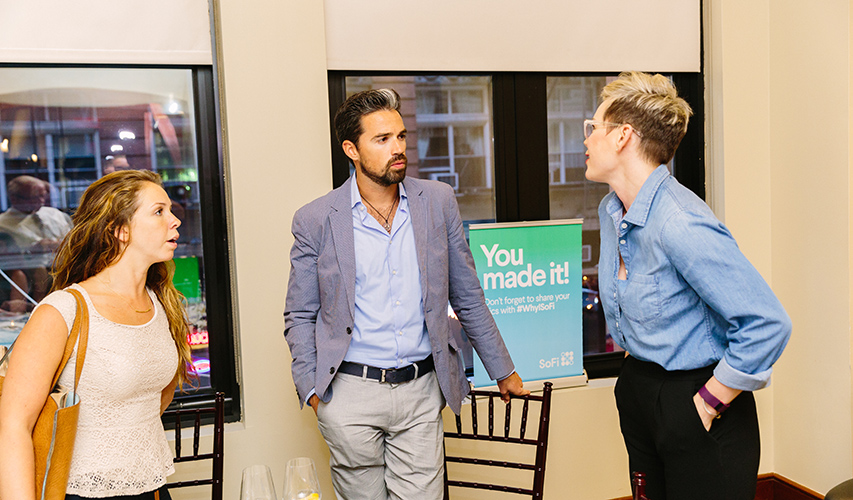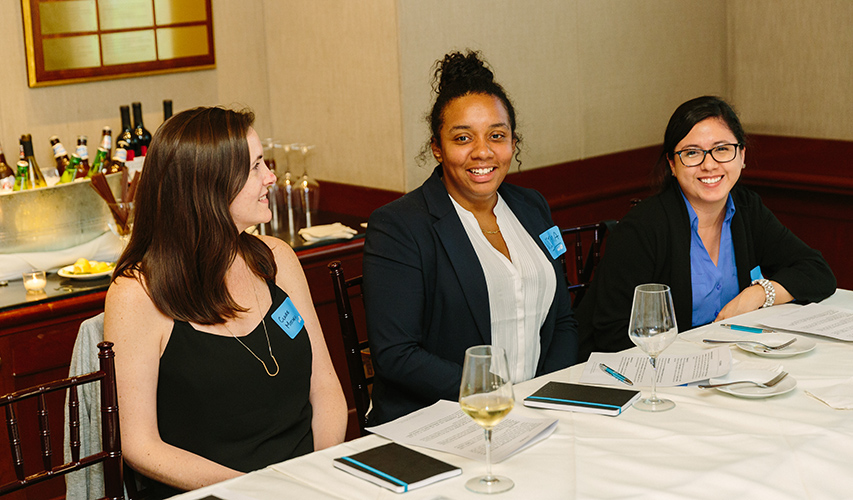Money + Happiness: New Tools For a Happy Life Despite Debt
At SoFi, we have a diverse community of driven members, who look to us for innovative approaches in reaching their financial goals. As educated professionals – many emerging in their careers – our members attend our community events to build their financial knowledge, enhance their careers, and connect with others equally motivated towards success. It’s why we do everything we can to help them grow, network, and have some fun as they navigate through life and their careers. Our latest event at New York University’s elegant Torch Club is a perfect example.
On June 29, Manhattan-based financial social worker Amanda Clayman presented Money + Happiness, an intimate “roundtable” discussion that highlighted Martin Seligman’s model of happiness —PERMA. Seligman, who is often called the “father of positive psychology,“ believes that happiness is based on five pillars: Positive Emotion, Engagement, Positive Relationships, Meaning, and Accomplishment/Achievement. Clayman believes that when the PERMA model is applied to one’s financial life, it can help reduce stress, clarify investment needs, and align happiness with financial goals.

“PERMA can help people restructure their financial lives,” says Clayman. “It’s a roadmap that we can all look to in terms of how our relationship with money can create well being. So much of our financial behavior is unconsciously motivated, so paying close attention to our behavior around money can help us clearly see how to manage our finances in ways that facilitate greater happiness.”
Attendees included 24-year-old Marissa Gordon, who works for JP Morgan Chase Bank. Although she already paid off her $60,000 student loan with the help of SoFi, she continues to attend SoFi events because of the stress surrounding other debt. Most recently, she used a credit card to buy $5,000 worth of furniture for her Brooklyn apartment.
Check Out Past SoFi Event — Mortgages: Made Easier With Happy Hour
“I feel anxiety when I am in debt, which causes me to pay it off quickly,” said Gordon, “but I deprive myself in the process.”
To demonstrate how money fuels happiness, Clayman opened the evening by asking the 25 members in attendance to recall the best experience that $100 had bought them in their lives thus far. Answers ranged from buying a pair of shoes to swimming with dolphins.
From there, Clayman dove into PERMA’s first pillar, Positive Emotion. She advised members who are just starting to invest to choose wisely and with an eye on “fun.” There’s nothing positive in investing “out of fear of obligation,” she said. For members with student loans, she suggested using positivity to create happiness in the moment, instead of deferring it until the debt is paid off. Every little bit paid toward a load helps to pay down that loan.
That advice helped member Kari Szul, who came to SoFi in 2014, with student loan debt she had incurred while pursuing an MBA at Hult International Business School. She is among the37% of Americans under age 40 who have accrued student loan debt.
“I felt that I would never get out of this obligation, even though I had a well-paying marketing job,” said Szul.

SoFi refinanced Szul’s student loans, allowing her to go from an interest rate of 8.69% to a variable 3.8% interest rate. That move enabled her to pay more toward the principal each month.
“I was stressed out about loans and servicing, but the process with SoFi was very hands on,” Szul added. “I was educated about my options, and now I see light at the end of a tunnel that I felt I couldn’t get out of before.”
The financial anxiety that young professionals like Szul often feel is part of transitioning from one life stage to another, noted Clayman. “Millennials have practical challenges. They are a more indebted generation because of the high cost of education. When you have a student loan, it can feel that there’s not much wiggle room,” she said. “Many are leaving school and entering the job market for the first time, while others are getting married or buying a home. Each of these people can feel reactive to their circumstances, so a road map like PERMA can help them better engage in the process.”
As members listened intently and took notes, Clayman moved on to the second pillar of PERMA—Engagement. “Engagement is recognizing our personal strengths, such as staying abreast of the balances we owe and tracking progress toward repayment,” Clayman said. By engaging fully in their finances, borrowers can support themselves as they go about the process of paying off creditors.
Engaging in investments is also important. For example, people can engage not only by analyzing their investments, but also by forming relationships with other investors. “Think of engaging as financially healthy behavior,” Clayman said. “Regularly connect with your money by actively managing it and being clear on your values around money. Your goals need to be in alignment with your behavior; if they’re not, overspending can occur.”

Certified financial planner Christopher Mackin, who also refinanced his student loans with SoFi, feels engaged by assessing future cash flow and laying out a budget. “Things always change in life, but it’s good to have an idea of how the future looks, near and far, and then budget accordingly,” said the 32-year-old SoFi member. “At the end of the day, cash flow planning brings me peace of mind.”
Applying the Positive Relationships principal of PERMA to finances involves connecting with others who are borrowers. And that, said Clayman, “helps create bonds with other people who are in the same boat.”
The strengthening relationships with the money aspect of PERMA hit home for many members, including Szul. “It really struck me,” she said. “Now that I am no longer consumed with how to get out of grad school debt, I can focus on goals and becoming more financially active. Getting a financial planner is something that I now have room to consider.”
Related: Want To Be Happy At Work? Here’s How To Find Purpose
The fourth pillar of PERMA, Meaning, is about “finding a positive story to tell ourselves,” said Clayman. One way to create a sense of meaning is “by keeping in mind your future self, who will rely on retirement savings and appreciate the sacrifices you make today.”
Creating a positive story around the value of the investment graduates have made in their futures can lead to contentment. “You’ve made an investment in your education and your future,” said Clayman. “To be happy and grounded, it’s important to feel positive about that relationship. Work toward finding ways to be peaceful now.”
SoFi member Lizz Naishtut is a 28-year-old senior product manager in the technology industry, who admits to struggling financially. She attended the event to gain an understanding of how money can increase her level of happiness despite the difficulties she’s experiencing.
“I’m at a negative net worth currently, but I realize that I’ll eventually be able to afford a house,” she said. “Taking little steps now can benefit me down the line.”

The evening concluded with a discussion of the Accomplishment/Achievement pillar of PERMA, in which Clayman suggested that the human need for achievement is around the desire for growth and mastery. “We can build on accomplishments in ways that don’t make us feel we are in a constant state of trying to achieve success, which is like going through life on a treadmill.”
Borrowers, for example, can recognize their progress at every step of the way, and then reward themselves every time they make a payment.
“Sometimes, especially if we’re competitive, we don’t let ourselves feel a sense of accomplishment until we get the final victory,” said Clayman. “But we can boost our sense of achievement when we give ourselves credit for the commitment it takes to make progress and reach milestones along the way.”
Alejandra Sotomayor, 28, walked away from the event with a way to recognize achievement in her financial life. “If I can focus on one financial goal at a time, I would feel calmer,” said Sotomayor, who has paid off 25% of her student loan debt since becoming a SoFi member last March. “I realize now that I really am accomplishing things.”
Check Out Upcoming Happy Hours, Dinners and More Educational Events in Your City!





